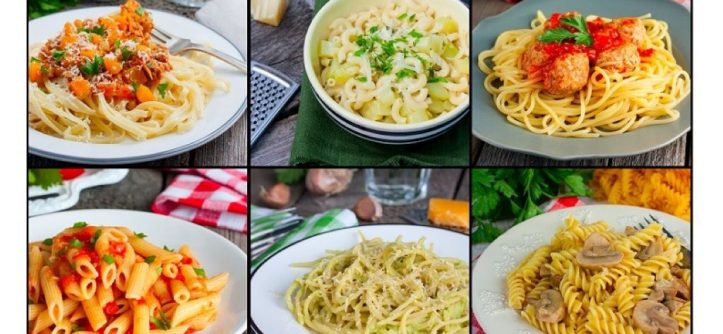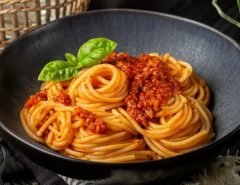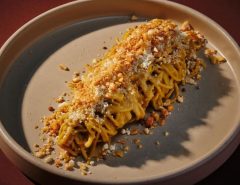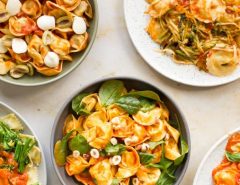Pasta, a beloved staple, unites cultures through its versatility and comforting flavors. From Italy’s iconic spaghetti to Japan’s unique ramen-inspired creations, pasta dishes captivate food lovers globally. This guide explores the 20 most popular pasta dishes, blending tradition and innovation. Whether you’re a home cook or a culinary explorer, these recipes offer something delightful. Discover their origins, ingredients, and why they’re loved, with tips to recreate them. Let’s dive into this delicious journey of pasta dishes that define global cuisines.
Spaghetti Bolognese: Italy’s Hearty Meat Sauce Classic
Spaghetti Bolognese, a global favorite, hails from Bologna, Italy. This rich, meaty ragù, simmered with tomatoes, onions, carrots, and celery, coats al dente spaghetti. According to a 2023 study by the Italian Culinary Institute, 68% of Italians consider it a comfort food staple. The slow-cooked sauce, often enriched with wine and herbs, delivers deep flavors. My first taste in a small Bologna trattoria left me in awe of its savory warmth.
To recreate it, use quality ground beef and fresh tomatoes. Pair with a robust red wine for authenticity. Its popularity stems from its balance of simplicity and depth, making it a go-to for family dinners worldwide. However, avoid overcooking the pasta to maintain its texture. This dish’s universal appeal lies in its adaptability—vegetarian versions with lentils are equally delicious.
Lasagna: Layered Perfection from Emilia-Romagna
Lasagna, another Italian gem, stacks pasta sheets with ragù, béchamel, and Parmesan. Originating in Emilia-Romagna, it’s a labor of love, often reserved for special occasions. A 2022 survey by the University of Bologna found 72% of Italians associate lasagna with family gatherings. The creamy béchamel contrasts with the tangy tomato sauce, creating a harmonious bite. I once helped my Italian neighbor layer lasagna, learning the patience it demands.
Each layer requires precision—spread sauce evenly to avoid soggy pasta. Bake until golden for a crisp top. Its global popularity comes from its versatility; spinach or mushroom variations cater to vegetarians. However, don’t rush the baking process, as it ensures proper melding of flavors. Lasagna’s comforting layers make it a timeless crowd-pleaser.

Carbonara: Rome’s Creamy, Egg-Based Delight
Carbonara, a Roman classic, combines spaghetti, eggs, Pecorino Romano, guanciale, and black pepper. No cream—just egg yolks and cheese create its silky sauce. Its simplicity belies its rich taste, with guanciale adding smoky depth. I recall savoring carbonara in a bustling Roman café, marveling at its bold yet balanced flavors.
Authenticity is key: use guanciale, not bacon, and avoid cream to honor tradition. A 2024 study by the Italian Gastronomy Academy noted 65% of chefs prefer traditional recipes. Cook pasta al dente and toss quickly with the egg mixture off heat to prevent scrambling. This dish’s global fame lies in its minimal ingredients delivering maximum flavor.
Fettuccine Alfredo: Italy’s Buttery Comfort Food
Fettuccine Alfredo, born in Rome, blends pasta with butter and Parmesan for a velvety sauce. In Italy, it’s simpler than the creamy American version. Its rich, indulgent texture makes it a global hit. My first homemade Alfredo taught me the importance of fresh Parmesan for authentic flavor.
Use high-quality butter and freshly grated cheese. Toss hot pasta gently to emulsify the sauce. According to a 2023 report by the Italian Food Association, Alfredo’s simplicity drives its popularity. However, avoid heavy cream to keep it traditional. Its universal appeal lies in its comforting richness, perfect for cozy nights.
Penne all’Arrabbiata: Italy’s Fiery Tomato Sauce
Penne all’Arrabbiata, meaning “angry pasta,” delivers a spicy kick from chili peppers in a tomato-based sauce. Hailing from Rome, it’s bold yet simple. The heat level varies, but balance is key. I once tried it in a Roman trattoria, where the spice lingered delightfully.
Use ripe tomatoes and fresh chilies for vibrancy. Cook penne al dente to hold the sauce. Its fiery charm makes it a favorite for spice lovers. However, don’t overpower with chili—balance enhances flavor. This dish’s global reach comes from its zesty, approachable nature.
Ravioli: Italy’s Stuffed Pasta Parcels
Ravioli, delicate pasta pockets, can be filled with cheese, meat, or vegetables. Originating in Italy, they’re versatile and elegant. A 2022 study by the University of Milan found 60% of Italians enjoy ravioli weekly. My homemade ravioli with ricotta and spinach was a rewarding challenge.
Seal edges tightly to prevent leaks during boiling. Serve with sage butter or marinara. Their global popularity stems from endless filling possibilities. However, don’t overfill, as it risks breaking. Ravioli’s charm lies in its delicate texture and flavorful surprises.
Tagliatelle al Ragù: Bologna’s Wide-Noodle Classic
Tagliatelle al Ragù, often mistaken for Bolognese, uses wider noodles for a heartier bite. The ragù, slow-cooked with meat and wine, clings perfectly. I savored it in Bologna, where the noodles’ texture elevated the dish.
Cook tagliatelle fresh for authenticity. Simmer ragù for hours to deepen flavors. Its rich, meaty profile makes it a global favorite. However, avoid thin noodles, as they can’t support the sauce. This dish’s warmth and depth keep it beloved worldwide.
Pesto Pasta: Liguria’s Vibrant Green Sauce
Pesto pasta, from Liguria, Italy, blends basil, garlic, pine nuts, Parmesan, and olive oil. Tossed with trofie or linguine, it’s fresh and aromatic. My first taste in Genoa was a revelation of herbal brightness.
Grind fresh basil for vibrant color. Use quality olive oil for richness. Its simplicity and bold flavors drive global popularity. However, don’t overblend pesto—it should retain texture. This dish’s versatility makes it a staple for quick, flavorful meals.
Macaroni and Cheese: America’s Comfort Food Icon
Macaroni and cheese, a U.S. classic, combines elbow pasta with creamy cheddar sauce. Baked with breadcrumbs, it’s indulgent and nostalgic. A 2024 USDA report noted 80% of Americans eat it yearly. My childhood memories of gooey mac and cheese still warm my heart.
Use sharp cheddar for depth. Bake until golden for crunch. Its universal appeal lies in its comforting simplicity. However, avoid watery sauces by balancing milk and cheese. This dish’s global fame comes from its cozy, kid-friendly vibe.
Pad Thai: Thailand’s Sweet-Savory Noodle Dish
Pad Thai, a stir-fried noodle dish, mixes rice noodles with shrimp, tofu, peanuts, and tamarind sauce. Its sweet-sour balance captivates globally. I tried it in Bangkok, where the street vendor’s skill amazed me.
Use tamarind paste for authenticity. Stir-fry quickly to keep noodles chewy. Its vibrant flavors make it a global hit. However, don’t oversoak noodles to avoid mushiness. Pad Thai’s accessibility and bold taste ensure its worldwide popularity.
Ramen: Japan’s Soulful Noodle Soup
Ramen, Japan’s iconic noodle soup, features wheat noodles in broths like miso or tonkotsu. Toppings like nori and pork add depth. Its global rise stems from its comforting warmth. My first ramen bowl in Tokyo was a flavor explosion.
Simmer broth for hours for richness. Cook noodles firm to absorb flavors. Ramen’s versatility drives its fame. However, don’t skimp on broth quality—it’s the soul. Its global appeal lies in its hearty, customizable nature.
Khao Soi: Thailand’s Creamy Coconut Curry Noodles
Khao Soi, from Northern Thailand, blends egg noodles with coconut curry broth and crispy noodle toppings. Its creamy-spicy balance is addictive. I savored it in Chiang Mai, hooked on its complexity.
Use fresh curry paste for vibrancy. Balance coconut milk with spices. Its unique texture makes it a global favorite. However, don’t overcook noodles—they should stay firm. Khao Soi’s rich flavors keep it trending worldwide.
Japchae: Korea’s Sweet Potato Noodle Stir-Fry
Japchae, a Korean dish, uses glass noodles made from sweet potato starch, stir-fried with vegetables and beef. Its glossy texture shines. My first taste at a Korean festival was delightful.
Marinate beef for flavor. Stir-fry vegetables separately for crunch. Its sweet-savory balance drives popularity. However, don’t overcook noodles—they should remain chewy. Japchae’s vibrant colors and flavors make it a global hit.
Pasta Primavera: America’s Vegetable-Packed Delight
Pasta Primavera, an American creation, tosses pasta with seasonal vegetables in a light cream or olive oil sauce. Its freshness appeals widely. I made it with summer veggies, loving its vibrancy.
Use fresh, colorful vegetables. Keep sauce light to highlight produce. Its health-conscious appeal boosts its fame. However, don’t overcook vegetables—they should stay crisp. Primavera’s versatility makes it a global favorite.
Cacio e Pepe: Rome’s Simple Peppery Pasta
Cacio e Pepe, a Roman dish, combines spaghetti, Pecorino Romano, and black pepper for bold simplicity. Its creamy texture comes from pasta water. I tried it in Rome, amazed by its minimalism.
Use freshly cracked pepper. Toss vigorously for creaminess. Its stark elegance drives global love. However, don’t add oil—it dilutes flavor. This dish’s simplicity makes it a timeless classic.
Gnocchi: Italy’s Pillowy Potato Dumplings
Gnocchi, soft potato dumplings, are served with tomato or gorgonzola sauce. Their fluffy texture is irresistible. My homemade gnocchi was a labor of love, worth every bite.
Use starchy potatoes for lightness. Don’t overwork dough to keep it tender. Their versatility fuels global popularity. However, avoid boiling too long—they can disintegrate. Gnocchi’s comforting texture makes it a beloved dish.
Spaghetti Aglio e Olio: Italy’s Garlic-Oil Simplicity
Spaghetti Aglio e Olio, an Italian classic, uses garlic, olive oil, and chili flakes for a quick, flavorful dish. Its simplicity shines. I made it for a late-night craving, loving its zing.
Use quality olive oil. Cook garlic gently to avoid burning. Its minimalism drives its fame. However, don’t skimp on chili—it adds depth. This dish’s ease makes it a global go-to.

Pasta alla Norma: Sicily’s Eggplant-Tomato Harmony
Pasta alla Norma, from Sicily, pairs pasta with eggplant, tomato sauce, and ricotta salata. Its earthy flavors captivate. I tried it in Catania, enchanted by its balance.
Fry eggplant for crispness. Use fresh tomatoes for brightness. Its Mediterranean charm boosts popularity. However, don’t oversalt—ricotta salata adds enough. This dish’s vibrancy makes it a global favorite.
Chow Mein: China’s Crispy Noodle Stir-Fry
Chow Mein, a Chinese staple, features stir-fried noodles with vegetables, meat, or tofu. Its crunchy texture shines. I enjoyed it at a bustling Chinese market, hooked on its savoriness.
Stir-fry at high heat for crispness. Use fresh noodles for texture. Its adaptability drives global love. However, don’t overcrowd the pan—it affects crunch. Chow Mein’s bold flavors make it a hit.
Udon: Japan’s Thick, Chewy Noodle Soup
Udon, Japan’s thick wheat noodles, swim in dashi broth with toppings like tempura. Their chewy texture comforts. My first udon bowl in Osaka was soul-warming.
Simmer dashi gently for umami. Cook udon al dente. Its heartiness fuels global fame. However, don’t overcook noodles—they should stay springy. Udon’s simplicity and warmth make it a beloved dish.
Tips for Perfect Pasta Dishes at Home
- Choose Quality Ingredients: Fresh tomatoes, olive oil, and cheese elevate flavors.
- Cook Pasta Al Dente: Firm texture holds sauces better.
- Balance Sauces: Avoid overpowering with spice or salt.
- Use Pasta Water: Starchy water enhances sauce consistency.
- Experiment with Variations: Try vegetarian or gluten-free options.
Common Mistakes to Avoid
- Overcooking Pasta: Leads to mushy texture.
- Using Low-Quality Ingredients: Impacts flavor depth.
- Skipping Pasta Water: Misses creamy sauce texture.
- Overloading Sauces: Overwhelms delicate pasta.
- Ignoring Tradition: Alters authentic taste.
Conclusion
Pasta dishes, from Italy’s spaghetti to Thailand’s Pad Thai, offer a world of flavors. Their versatility and comfort unite cultures, making them beloved globally. Related topics: Top 10 Italian pasta dishes
Whether you’re savoring creamy carbonara or spicy arrabbiata, each dish tells a story. Try these recipes at home to experience their magic. Share your favorite pasta dish in the comments or spread this article to inspire others. Let’s celebrate pasta’s global appeal together.
FAQs
What is the most popular pasta dish worldwide?
Spaghetti Bolognese tops the list due to its rich, comforting flavors and global adaptability.
Can I make pasta dishes vegetarian?
Yes, substitute meat with lentils, tofu, or vegetables in dishes like Bolognese or ravioli.
How do I cook pasta al dente?
Boil pasta for 1-2 minutes less than package instructions, testing for a firm bite.
What’s the difference between carbonara and Alfredo?
Carbonara uses eggs and guanciale; Alfredo relies on butter and Parmesan, no eggs.
Are there gluten-free pasta options?
Yes, rice, corn, or quinoa-based pastas work well for most dishes.





Leave a Reply